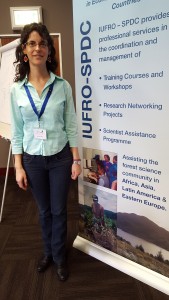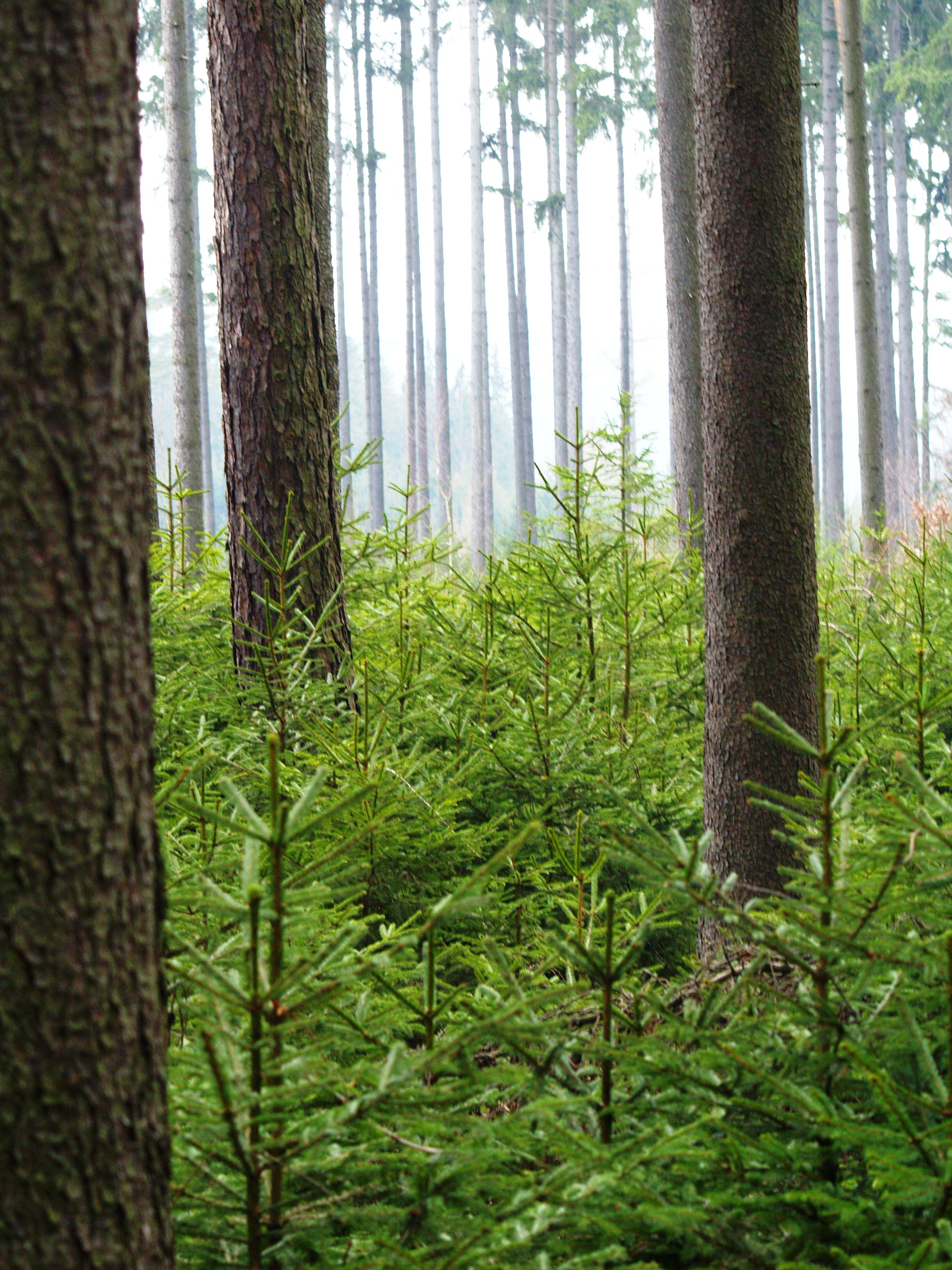The power of social innovation to increase the wellbeing of forest-dependent communities in the Carpathian and other mountain regions
The power of social innovation to increase the wellbeing of forest-dependent communities in the Carpathian and other mountain regions
The IUFRO Working Party 4.05.05 Social innovation and entrepreneurship organised a special session of the6th Forum Carpaticum entitled “The power of social innovation in mountain areas to steer a sustainable governance of nature”. Scientists from over the world were brought together (online) to discuss the emergence and development of social innovation in the Carpathian Mountains and beyond. The Forum’s presentations included a conceptual talk based on findings on social innovation in mountain forestry from H2020 SIMRA project coordinated by James Hutton Institute, topics on how social innovation can offer transformative opportunities to forestry in Ukraine; communities’ empowerment through carbon forestry in Slovakia; impacts of social innovation on inequalities in mountain–lowland relationships in Swiss Alps; citizen science and adopting Living Lab approach to foster sustainability transformations and foster biodiversity conservation through participatory management of nature protected areas, and others.
Read more…View from the forest: the interlinked crises of COVID-19, environmental degradation and inequity – A Guest Blog
The underlying cause of the COVID-19 pandemic is the spill-over of a virus from a presumed bat wildlife source – and its spread in the vast human population and its vulnerable systems. There are many questions yet unanswered about the virus’s source – which species of bat, was it sold in the Wuhan Wet Market, did a number of bat-human transmissions occur or were transmissions to other animal species involved in the development of a virus capable of human to human transmission. For the moment all efforts are on controlling the disease. It has emerged and spread rapidly around the highly connected planet. In the long run, understanding how to prevent further such pandemics will be a major focus.
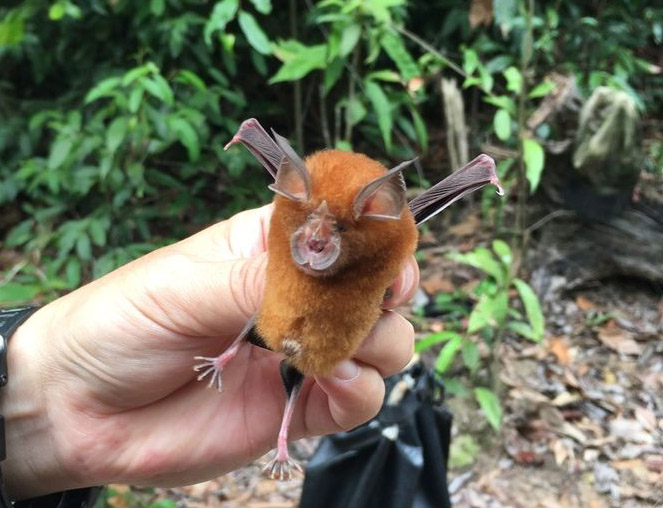
Link to license: https://creativecommons.org/licenses/by-nc/4.0/legalcode
IUFRO 125th Anniversary Congress Spotlight #47 – Remote forest-dependent communities can benefit through social innovation
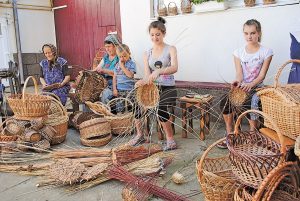
The village of Iza in Transcarpathian Ukraine is famous far beyond the region’s borders for its wicker products. Most villagers are involved in the business.
http://ukurier.gov.ua/uk/articles/selo-iza-na-zakarpatti-postachaye-virobi-z-verbi-d/
Many rural forest-dependent communities face similar challenges – lack of infrastructure, housing, and transport as well as aging populations.
When global issues such as climate change, sustainability, and energy and food security are added to the mix, the need for solutions to the challenges becomes much more pressing. Read more…
Local approach is crucial to making forest and landscape restoration a success
A 3-day training workshop on science-policy interactions for forest and landscape restoration took place on 4-6 September 2015 in Durban, South Africa, prior to the World Forestry Congress. The workshop was organized by IUFRO’s Special Programme for Development of Capacities (SPDC) in collaboration with the World Resources Institute (WRI), and brought together a group of 14 early and mid-career scientists, educators and professionals from developing countries in Africa, Asia, and Latin America. http://www.iufro.org/science/special/spdc/actproj/twdurban/ Read more…
Learning how others deal with forest & landscape restoration and applying new knowledge at home
Interview with four participants of the IUFRO-SPDC/WRI training workshop on science-policy interactions for forest and landscape restoration on 4-6 September 2015 in Durban, South Africa, prior to the World Forestry Congress: http://www.iufro.org/science/special/spdc/actproj/twdurban/
Mercedes Sá is a Forestry Engineer from Argentina. She works for the national government in the Directorate of Forestry. She is not a traditional scientific researcher because her every day work is related with the supervision of conservation and management plans of native forestry resources, including restoration activities, that all the provinces of Argentina approve for the compensation of environmental services under the framework of a National Law. Read more…
Spotlight #32 – Sharing Knowledge to Rebuild Tropical Forests and Landscapes
Sharing Knowledge to Rebuild Tropical Forests and Landscapes
Tropical forests contain a huge amount of biological diversity, play a key role in human health, offer a vast array of ecosystem services and have become central to global debates on climate change.
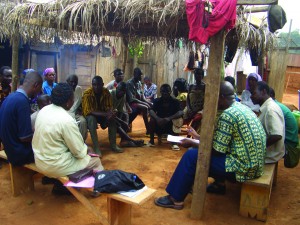 But extensive deforestation and degradation are causing a significant decline in the biological diversity and the ecosystem goods and services provided by them. And, in many African countries there is a notable connection between degradation and the inability of decision makers – and the larger society – to access existing scientific knowledge and innovations that could help reverse the impacts of forest degradation. Read more…
But extensive deforestation and degradation are causing a significant decline in the biological diversity and the ecosystem goods and services provided by them. And, in many African countries there is a notable connection between degradation and the inability of decision makers – and the larger society – to access existing scientific knowledge and innovations that could help reverse the impacts of forest degradation. Read more…
Congress Spotlight #17 – Forest outlook: What does the future hold?
Forest outlook: What does the future hold?
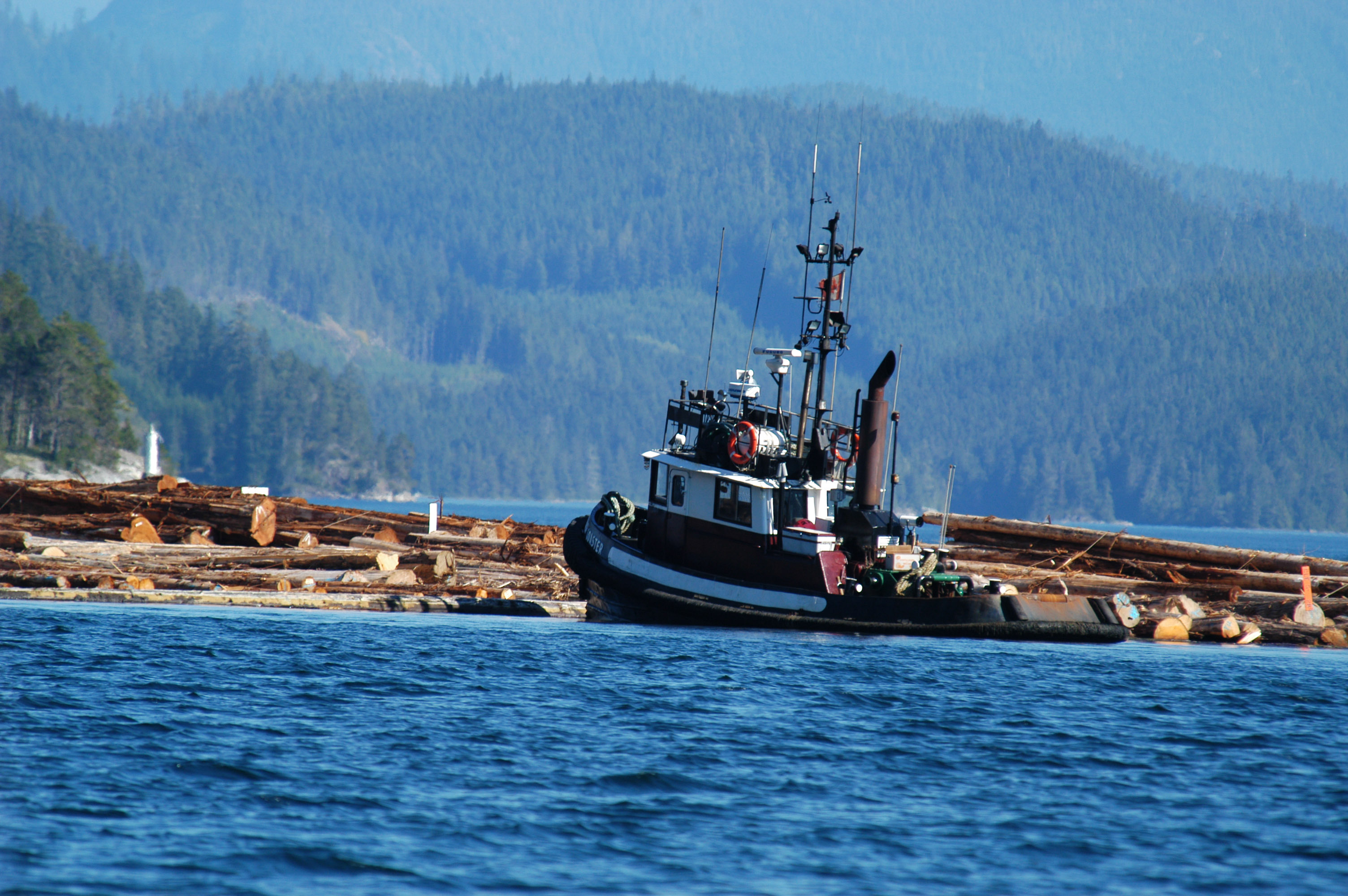
Logs being moved by sea to a sawmill. Major changes in the patterns of demand for logs may result in them being processed in a different country to where they were harvested. (Photo by John Innes)
Forest researchers from around the world will gather at the IUFRO 24th World Congress in Salt Lake City this fall where one of the issues will be to address the future, and the related challenges, facing forests and forest management in the 21st century.
Providing a sort of scientific crystal ball to give glimpses into the years ahead and discuss how to meet and adapt to coming challenges will be a sub-plenary session at the congress entitled, appropriately enough, “The Future of Our Forests”.
Resources for the Future (http://www.iufro.org/science/task-forces/resources-for-future/), the IUFRO Task Force behind this session, has set out to examine four major game-changers – globalization, plantations, new products and forest ecosystem services – and what they mean, and will mean, for forests, forest research and forest-dependent communities.
IUFROLAT III Session Highlights: Traditional Forest Knowledge
Traditional forest-related knowledge: its contribution to sustainable forest landscape management
For more information on IUFRO Taskforce on Traditional Forest Knowledge: http://www.iufro.org/science/task-forces/traditional-forest-knowledge/
The general consensus of why forests are important is changing to include not only the economic benefits but the cultural and social attributes as well. There is an increasing recognition of the relevance of traditional-forest related knowledge (TFK) in new science, policy and management issues. It is important to understand TFK and its role in our past and how we can apply it in the future.
The session entitled “Traditional forest-related knowledge: its contribution to sustainable forest landscape management”, brought together a roomful of researchers to discuss the importance of TFK in forest science, policy making, and cultural heritage.
John Parrotta, presented on IUFRO activities in TFK and highlighted the publication, “Traditional Forest–Related Knowledge: Sustaining Communities, Ecosystems”, that provides an up-to-date summary of the emerging field of traditional forest management. He introduced the key elements to TFK including; sustainability, relationships, identity, reciprocity, and limits on exchange and highlighted the importance it plays in our food security, agricultural productivity, monitoring environmental change, and preparing for climate change mitigation and adaptation.
TFK and practices have sustained, and continue to sustain, the rich cultures and livelihoods of rural communities in spite of significant political, social, and economic obstacles.
In his presentation, Christian Gamborg, to great agreement, highlighted the main problem in TFK – it is being lost by its holders, there is inadequate enforcement of national and international commitments to support TFK, it lacks recognition by users and there is potential misappropriation of knowledge. The relation between science and TFK is growing stronger and there can be mutually beneficial. When holders of TFK and scientists meet it is important to ensure that there is free, prior and informed consent and that the results of the research and projects are readily accessible in order to benefit share. Perhaps, most importantly it was stressed that there needs to be protection efforts to deal with traditional knowledge.
Marco Fioravanti introduced a new side to TFK by identifying the forces that drive our personal development and societal collective development in the context of the history of wood. Wood has been utilized to create objects which are now cultural artefacts, and part of our identity. He highlighted how the wood use, and crafting processes of the people of past serve as a repository of technological knowledge and intangible knowledge. TFK and historical wood products and buildings preserve our history and identity.
Monica Gabay spoke of the history of indigenous people in Argentina, Bolivia, and Chile and how they interpret the forest compared to the people who conquered the area. She highlighted in importance the forest played in the lives of the indigenous that depended upon it for their survival, medicine, food, and culture. Forests also played an important part in the spiritual life of the indigenous as many of their Gods lived in the forest. After the settlement by the Spaniards, the forest was not seen as the support of man but as a tool to be used. This transition in thought persists to this day, as often Forests are identified as non-productive land
Miguel Pinedo, brought forth the example of the people of the Amazon and how their traditional knowledge is not folklore, it is a practice used daily in many communities. In his example, he showed how the forest dependent communities are adapting to a changing landscape that sees greater flooding, long droughts, and fires. Communities are responding to the floods. These shifts come in the form of switch to subsistence based agriculture from commercial, greater reliance on forestry and agroforestry systems, a diversification of the use of forest products, and more reliance on urban-rural networks. Smallholder systems are inherently adaptable and we can learn from them. It was recommended that local responses to events are documented, policies are crafted to support response mechanisms rather than destroy them, and the systems in place are built upon instead of replaced.
The sessions agreed that TFK is rarely considered or incorporated into adaptation initiatives at global, regional, or national levels, even though they are important resources for dealing with vulnerability to climate change, as well as changes in markets and policies.
Presentations in this session:
Traditional forest-related knowledge: Sustaining communities, ecosystems and biocultural diversity (John Parrotta, US Forest Service, USA)
Facilitating Greater Engagement with Forest Peoples: Ethics and Research Methodologies for TFRK Study (Christian Gamborg, University of Copenhagen, Denmark)
The use of history in the assessment and understanding of traditional forest-related knowledge. (Mauro Agnoletti, University of Florence, Italy)
Traditional forest-related knowledge in Argentina, Bolivia and Chile. (Monica Gabay, Secretaria de Ambiente y Desarrollo Sustentable, Argentina)
Traditional Forest Knowledge: An Amazonian resource for adaptation and mitigation to climate change. (Miguel Pinedo, CIFOR)
Forests are a Path to Sustainable Development
13 May 2011, New York – As discussions draw to a close at the UN Commission on Sustainable Development (CSD) in UN Headquarters this week, members of the Collaborative Partnership on Forests (CPF), an international mechanism composed of 14-forest related organizations and secretariats, are calling upon countries to pay more attention to the crucial contribution of forests to sustainable development.
Members of the CPF are working to improve management, conservation and sustainable development of all types of forests. Sustainably managed forests contribute directly to poverty reduction by providing jobs, incomes, and consumable goods for poor families.
“At a time when we are faced with environmental, social, and economic crises that are daunting; the CPF is working intensively together to further catalyze the positive contributions of forests, including the livelihoods of forest-dependent people, as is being celebrated in 2011, the International Year of Forests.” says Jan McAlpine, Director of the United Nations Forum on Forests Secretariat. “Forest services and benefits are multifaceted and wide-ranging, from the environmental contributions to the social and economic. Cross-sectoral and cross-institutional cooperation and a people-relevant approach is vital not only to management of forests but for advancing sustainable development around the world.”
“Further analysis is needed during the International Year of Forests, to emphasize the connection between people and forests, and the benefits that can accrue when forests are managed by local people in sustainable and innovative ways” says Eduardo Rojas-Briales Assistant Director-General of the FAO Forestry Department. “Together we must continue to pursue multiple pathways towards sustainable development using forests at all levels.”
Rojas called attention to the 2011 edition of FAO’s State of the World’s Forests, which provides an analysis of how forests support people’s livelihoods and the development of sustainable forest industries. According to the report, forest industries are improving resource efficiency and recycling efforts and are making progress in promoting wood products as more environmentally friendly than alternative materials. Moreover, State of the World’s Forests 2011 indicates that community-based and traditional knowledge forest management approaches can help communities harvest and sell non-wood forest products to create more sustainable livelihoods.
The relevance of traditional forest-related knowledge and practices to global efforts to advance sustainable forest management, biodiversity conservation, adaptation to environmental change, and livelihood security is highlighted by a 6-year global study that has recently been completed by the International Union of Forest Research Organizations.
Emmanuel Ze Meka, Executive Director of the International Tropical Timber Organization noted that “Already in many tropical countries, sustainably managed forests and the products that arise from them are contributing to sustainable development at both the national and especially at the community level. But since sustainably managed forests still make up less than 10% of the total global tropical forest area, they clearly have the potential to play a much bigger role.”
A successful example of sustainable forest management can been seen in Guinea, where the Landscape Management for Improved Livelihoods (LAMIL) project by the World Agroforestry Centre and the Centre for International Forestry Research has had a profound influence on the sustainability of four large forest areas. Prior to the project, local people were forbidden from using the forest resources and illegal logging, poaching and land clearance were leading to forest loss. The LAMIL project developed a system of co-management involving local communities and government where the local people derive real benefits from the forests, and in return have shown their willingness and ability to manage them sustainably.
“The project illustrates how changes in how forests are governed can lead to win-win outcomes for forests and people,” commented Frances Seymour, Director General of the Center for International Forestry Research. “This project has done much to improve the welfare of the local people,” said Dennis Garrity Director General of the World Agroforestry Center. “It has also shown that sustainable forest management and improved livelihoods are inextricably linked.”
“Forests, soils and water are a trilogy that are not stand-alone, self-sustaining resources” says Luc Gnacadja, Executive Secretary of the United Nations Convention to Combat Desertification. “To foster a holistic approach to the management of these environmental resources, we must attend to three things. First, we need to focus on the causes, not the symptoms of deforestation. Second, we also need to focus on the soil, which is the real source of life for the land. Third, the communities that maintain the ecosystems we depend upon need to be rewarded.”
At the recent United Nations Forum on Forests (UNFF) meeting in February, ministers and high officials agreed on a Ministerial Declaration which stresses that “forests are an integral part of the global environment and human well-being, providing multiple goods and services essential for people worldwide and crucial for sustainable development and the achievement of the internationally agreed development goals, including the Millennium Development Goals.” The UNFF Ministerial Declaration contains the most important global forest policy issues and concerns as the concrete input on forests to the upcomingRio+20 conference. Rio+20 (June 2012), marks the twentieth anniversary of the adoption of Agenda 21, the blueprint for sustainable development, agreed upon at the 1992 United Nations Conference on Environment and Development. The conference will review progress made towards sustainable development and map out future strategies to address sustainable development and environmental challenges.
For more information:
Gerda Wolfrum, wolfrum(at)iufro.org, International Union of Forest Research Organizations (IUFRO)

